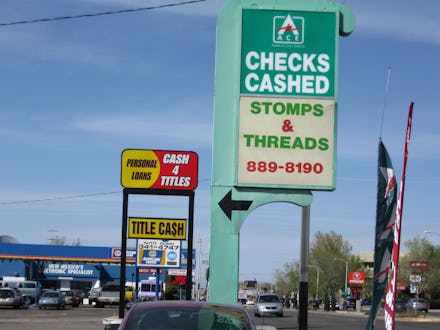South Dakota's two payday loan ballot measures look similar but have a crucial difference

South Dakota, which has one of the nation's highest interest rates on payday loans — an average of 652% — has two measures on the ballot for November that both seem to rein in the industry.
Payday loans let borrowers get cash advances on their paychecks, at least in theory. In reality, you take out a small amount of money at an extremely high interest rate relative to what you'd pay even on a credit card. Because their rates are so high, payday lenders are often criticized for targeting poorer, more vulnerable populations.
One group in South Dakota is trying to fight back, but they are clashing with a similarly-named group — with a lot more financial backing.
The first organization is called "South Dakotans for Responsible Lending," which has proposed a ballot initiative that would cap interest rates at 36%, making it much harder for South Dakotans to get stuck in cycles of debt, according to Governing magazine.
However, there's also another similar-seeming measure on the ballot: one that some say wouldn't be as effective.
This second proposal is backed by the group "South Dakotans for Fair Lending" and would cap loans at 18% — unless the borrower agrees in writing to pay a higher rate.
That latter part is a pretty crucial difference.
"[The 18% proposal is] not going to do anything to cap interest rates in South Dakota," Steve Hildebrand, who works with South Dakotans for Responsible Lending, told Governing.
In fact, it would end up being a "decoy law," he told the Argus Leader.
That's because allowing borrowers to agree in writing to a higher rate would basically prevent the law from having any teeth: Payday loans have such high interest rates that the people who use them tend to be really desperate, and less likely to scrutinize or necessarily understand what they're signing up for.
It's not simply about laziness or a lack of education.
Payday loans are already notorious for confusing fine print. And one University of Chicago study found that only one or two in 1,000 online shoppers actually read license agreements when they make purchases.
There's also good evidence that payday loans trap borrowers in cycles of debt: Often, borrowers have to take out new payday loans just to pay off old ones, in a process called flipping. The average payday loan is flipped eight times.
Those who defend the 18% cap (with weaker enforcement) say their measure will be easier on payday lending businesses, which means people will have better access to payday loans — which they argue is a good thing.
In an interview with South Dakota War College, South Dakotans for Fair Lending chair Lisa Furlong said, "Our measure strikes the right balance in protecting people from predatory lending and preserving free market principles to ensure their access to credit."
Assuming you don't quite buy that argument, there's bad news.
So far, South Dakotans for Fair Lending has outspent South Dakotans for Responsible Lending by a ratio of 75-1.